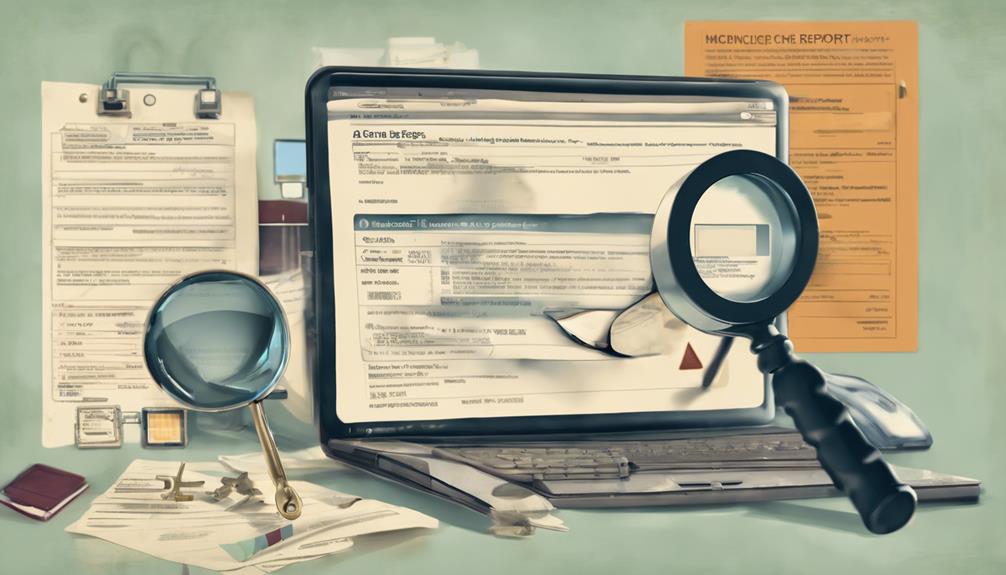Under the Fair Credit Reporting Act (FCRA), you have the right to access and review your credit reports for free every year, dispute incorrect or outdated information, and expect credit bureaus to investigate disputes within 30 days. You can also request that inaccurate details be corrected or removed. Staying aware of these rights helps you protect your credit score and financial health. To learn more about how to exercise these rights effectively, keep exploring this important law.
Key Takeaways
- The FCRA grants consumers the right to access, review, and dispute inaccurate or outdated information in their credit reports.
- Consumers can initiate free disputes with credit bureaus if they find errors, which must be investigated within 30 days.
- You have the right to request a correction or deletion of incorrect or incomplete information on your credit report.
- The law requires credit bureaus to notify you of the results after investigating your dispute.
- Regularly reviewing your credit report helps ensure accuracy and protect your creditworthiness.

The Fair Credit Reporting Act (FCRA) is a crucial law that protects your right to accurate and fair credit reporting. When you check your credit report, you want to verify that the information reflected is precise since it directly impacts your credit score. Your credit score influences loan approvals, interest rates, and even your chances of renting a home. If you notice any inaccuracies, it’s essential to understand how the dispute process works under the FCRA. This law gives you the authority to challenge incorrect or outdated information on your report and requires credit bureaus to investigate your claims promptly.
The FCRA protects your right to accurate credit reports and requires prompt investigation of disputes.
Your first step is to review your credit report carefully. Look for errors such as wrong account details, outdated information, or accounts that don’t belong to you. If you find inaccuracies, you should initiate a dispute process with the credit bureau that generated the report. You’re entitled to dispute any information you believe is incorrect or incomplete at no cost. When you file a dispute, you must provide specific details about what you think is wrong and, if possible, supporting documentation. The credit bureau then has 30 days to investigate your claim, during which they will contact the data furnishers, like lenders or credit card companies, to verify the information.
Throughout this process, your right to dispute inaccurate data can considerably influence your credit score. Correcting errors can improve your score, making it easier to qualify for favorable loan terms or credit cards. Conversely, failing to dispute incorrect information can harm your credit profile, potentially leading to higher interest rates or denial of credit. The FCRA also stipulates that if the investigation finds the disputed information is indeed inaccurate, the credit bureau must update or delete it within a reasonable timeframe. They are also required to notify you of the results of the investigation and provide you with a copy of your updated report if changes are made.
Knowing your rights under the FCRA empowers you to actively manage your credit profile. Regularly checking your report and understanding the dispute process ensures you can correct errors before they negatively impact your credit score. It’s your right to have accurate information reported, and the law supports you in maintaining a truthful credit history. Understanding the dispute process can help you navigate your rights effectively. By staying vigilant and proactive, you can safeguard your financial health and ensure that your credit report accurately reflects your creditworthiness.
Frequently Asked Questions
Can I Request a Free Credit Report Outside of the Annual Free Report?
You can request a credit report outside of the annual free report if you have specific reasons like suspected fraud or certain financial hardships. Your credit report access is generally limited to one free report per year, but you may be eligible for additional free reports depending on your circumstances. Always check your free report eligibility and stay informed about your rights to monitor your credit regularly without extra costs.
How Long Can Negative Information Stay on My Credit Report?
You might wonder about your credit report duration and how long negative entries stay. Generally, negative information remains on your credit report for about seven years, while bankruptcies can stay up to ten years. This negative entry lifespan affects your credit score and financial opportunities. Regularly check your report to verify accuracy and understand how long each type of negative entry can impact your credit health over time.
What Should I Do if I Find Inaccurate Information on My Report?
Imagine spotting a typo or outdated detail on your credit report like a crack in a mirror. You should immediately initiate the dispute process, clearly explaining what’s wrong. Gather all documentation needed, such as bank statements or letters, to support your claim. Submit your dispute online, by mail, or phone. Acting quickly helps correct errors, ensuring your credit report accurately reflects your financial history.
Do All Lenders Follow the Same Reporting Guidelines Under the FCRA?
You might wonder if all lenders follow the same reporting standards. While there’s some lender consistency, reporting practices can vary because each lender may have different policies. The FCRA sets guidelines to guarantee accuracy and fairness, but not all lenders adhere strictly to every detail. It’s smart to regularly check your credit report for discrepancies and understand that reporting standards can differ between lenders.
How Often Can I Dispute Errors on My Credit Report?
You can contest errors on your credit report as often as needed through the dispute process. Typically, you should review your credit report regularly, especially with credit monitoring services, to catch inaccuracies early. Once you find an error, submit a dispute to the credit bureau, which is obliged to investigate within 30 days. Keep track of your disputes and follow up if necessary to ensure all corrections are made promptly.
Conclusion
Think of the Fair Credit Reporting Act as your shield in a bustling marketplace. Just as a shield protects you from unexpected blows, this law guards your financial reputation from unfair hits. Knowing your rights means you’re equipped to navigate the busy world of credit reports confidently. Stay vigilant, ask questions, and stand firm—your financial future is worth defending. With this knowledge, you’re the knight guarding your own credit kingdom.









